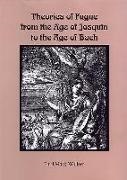Read more
This is a fine and valuable book, encyclopaedic in its coverage of the subject, and the only treatment (in any language) of the entire field. It is an extraordinary achievement. MUSIC & LETTERS Lucidly and engagingly written...this book is an outstanding contribution to scholarship and a definitive work, indispensable for the historical study of fugue. THE AMERICAN ORGANIST Few bodies of Western music are as widely respected, studied, and emulated as the fugues of Johann Sebastian Bach. Despite the esteem which Bach's contributions brought to the genre, however, the origin and early history of the fugue remain poorly understood. Theories of Fugue from the Age of Josquin to the Age of Bach addresses both the history and methodology of the pre-Bach fugue (from roughly 1500 to 1700), and, of greatest significance to the literature, it seeks to present a way out of the methodological dilemma of uncertainty which has plagued previous scholarly attempts by considering what musicians of the time had to say about the fugue: what it was, what it was not, how important it was, and where and how a composer should (or shouldn't) use it. Eastman Studies in Music, Volume 13. PAUL MARK WALKER is director of the Early Music Ensemble at the University of Virginia and an expert on the history of the fugue.
List of contents
Part 1 Fugal theory of the Renaissance and early Baroque: fugue in the High Renaissance; fugue at the end of the Renaissance, I - Italy and the Netherlands; fugue at the end of the Renaissance, II - Germany; German theory during the Thirty Years War - fugue in Latin School music texts. Part 2 The makings of the modern fugue - Italy and Germany in the mid-17th century: Italian influence on German fugal theory, 1640-1680; instrumental fugue at the emergence of fugal structure in the third quarter of the 17th century; the Hamburg circle of theorists - invertible counterpoint, the countersubject, and permutation fugue. Part 3 German fugal theory of the mature Baroque, 1680-1740: fugal theory, 1680-1710; fugal theory in German lexicographic texts; fugal theory, 1710-1740 - Mattheson and Fux.

